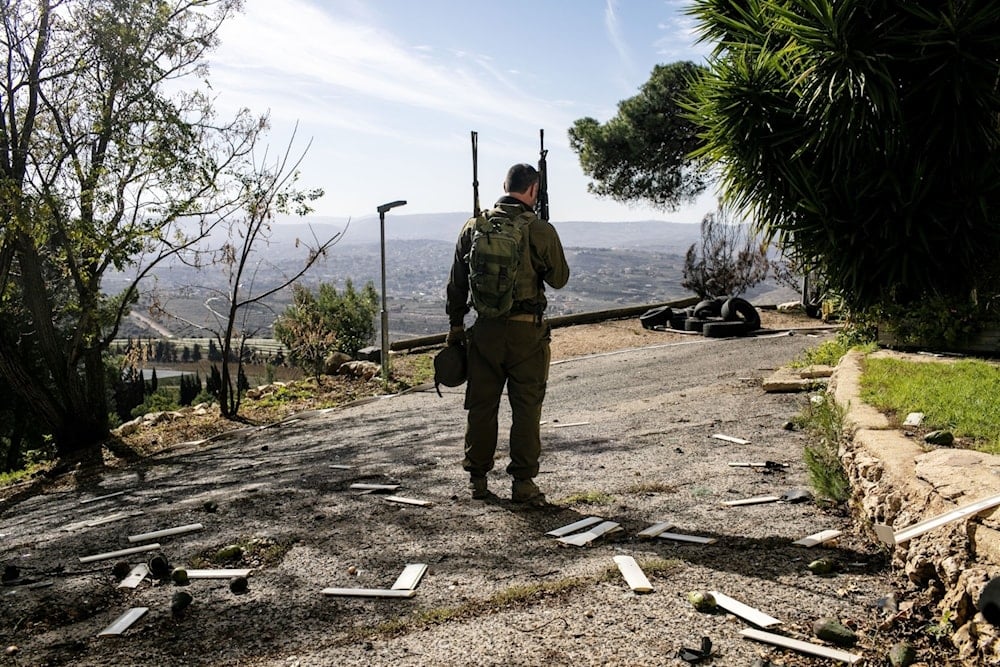Reverse UNSC Resolution 1701 enacted in north 'Israel': Ex-General
A former Israeli top official asks for the implementation of UNSC Resolution 1701 and enacting a ceasefire with Lebanon amid the escalations in the north.
-

An Israeli soldier stands over traces of destruction as a result of the Islamic Resistance in Lebanon’s targeting of the "Al-Manara" military site in northern occupied Palestine (Bloomberg)
There is a reverse UNSC Resolution 1701 in northern occupied Palestine, the former commander of the Israeli occupation forces' Operations Directorate, Israel Ziv, said on Sunday, reminding of the August 11, 2006 UN Security Council Resolution on a ceasefire alongside the Lebanese-Palestinian borders.
Ziv told Israeli Channel 12 that the situation in the Israeli settlements in northern occupied Palestine was catastrophic. "They talk of UNSC Resolution 1701, but in fact, it is a reverse Resolution 1701. We have 70,000 internally displaced refugees in Israel."
The former Israeli official expressed concern over the Israeli occupation going out and saying that it would implement UNSC Resolution 1701 and take more initiative to end the hostilities.
However, he also underlined that there was an evergrowing fear of an all-out war, demanding that this path be followed, as it is "needed".
Resolution 1701 was reached in the wake of the 2006 Israeli war on Lebanon. It calls for the full cessation of hostilities and the deployment of the Lebanese Army to Southern Lebanon, as well as the establishment of a demilitarized zone between the Blue Line and the Litani River.
Commenting on the state of the battlefront along the Lebanese-Palestenian borders, Israeli Kan channel military affairs analyst, Roi Sharon said it was clear that Hezbollah "is running things in the North" pressing the Israeli Occupation Forces into defense.
Sharon warned that if the fighting in the north escalates a notch it would entail an all-out war.
Sharon also described Netanyahu's threats regarding making Beirut and the Lebanese south like Gaza if Hezbollah starts a total war as being only "half- threats".
Hezbollah rendering Israeli nights sleepless
Since the first day following Operation Al-Aqsa Flood, the Resistance in Lebanon, led by Hezbollah, has been targeting military sites and gatherings of the Israeli occupation forces along the blue line, in solidarity with the Palestinian resistance and response to the ongoing attacks by the occupation against southern Lebanese towns.
Read more: Hezbollah targets IOF vehicles as latter launches phosphorous bombs
Earlier today, the Islamic Resistance in Lebanon - Hezbollah executed several operations against Israeli military sites in occupied territories on Thursday.
Resistance fighters targeted the military site of "Ma'ayan Baruch", located to the east of "Metulla" on the Palestinian side of the border. Israeli media outlets said Israeli occupation forces investigated the incident, suspecting that an anti-tank guided missile was used in the attack.
The Resistance also targeted al-Marj military sites and "Ramim" ًWoodlands military sites, dealing direct hits to the intended targets.
A few hours later, al-Marj site came under attack by the Islamic Resistance, with direct hits recorded.
'Military solution'
The head of the Israeli settlement of "Metula", David Azoulai called on the Israeli government and the Israeli occupation forces to "act militarily" in Lebanon, Israeli Channel 14 reported in late November.
"We are still behaving in the lax policy of before October 7; we must showcase our strength," he said. "The whole world is watching, including the surrounding Arab states."
Azoulai underlined that he was constantly hearing that the Israeli occupation managed to deter the Islamic Resistance in Lebanon - Hezbollah, which he denied, by stressing that it was "Israel" instead that was deterred.
"It's important to understand this. Whoever wants to come and see how deterred the state of Israel is and how undeterred Hezbollah is can come to Metula," he said.
"We've been seeing them again on the borders for the past three days now," the Israeli official added.
According to Azoulai, he had a meeting with the Chief of Staff of the Israeli occupation forces and threw in his face the fact that the relationship of trust between settlers and the IOF was damaged.
"He talked about the sense of security - I don't want a sense of security; I want security," he underlined. Israeli settlers, he added, "deserve real security."
Those very Israeli settlers, he said, have already "changed the discourse", while politicians were yet to do so.

 4 Min Read
4 Min Read










